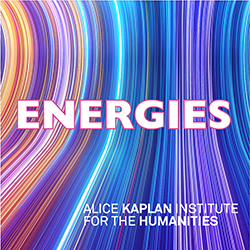Tracing the Decolonial Turn in Data Research: Notes on Intersecting Energy Cultures and Environmental Media - Rahul Mukherjee

When:
Thursday, March 2, 2023
5:15 PM - 6:45 PM CT
Where: Kresge Hall, #2351 (Kaplan Institute), 1880 Campus Drive, Evanston, IL 60208 map it
Audience: Faculty/Staff - Student - Public - Post Docs/Docs - Graduate Students
Cost: Free; public welcome!
Contact:
Jill Mannor
(847) 467-3970
jill.mannor@northwestern.edu
Group: Alice Kaplan Institute for the Humanities
Category: Academic, Lectures & Meetings
Description:
Tracing the Decolonial Turn in Data Research: Notes on Intersecting Energy Cultures and Environmental Media
“‘Global’ Big Tech social media companies, fintech corporations, and video-on-demand streaming services are criticized for being data accumulators and aggregators, and for implementing a regime of ‘data colonialism’ based primarily on data extraction as a new kind of capitalistic resource extraction. The decolonial turn in data research asks for nuancing the ‘data colonialism’ thesis by asking critical data studies scholars and activists to think beyond ‘datafication as resource extraction’ to questions about epistemic and ontological (in)justices, and the need for epistemological re-positionings (Mumford, 2022). Even as ‘Big Tech’ social media companies are criticized by particular national(ist) ruling regimes for their data extraction practices, the government supported ‘national’ social media and telecom companies are not engaging in decolonial practices themselves given their participation in global networked capitalism(s).
"In this talk, I discuss how debates about location of data centers in particular countries is imbricated in debates about data colonialism and intersecting energy cultures. With vehement critiques of data colonialism in India, there is increasing demand for data centers to be housed within India if they are storing data about Indian citizens. Data centers are energy guzzlers, and with rapidly depleting coal and oil reserves and concerns about climate change, data center companies are increasingly asked to embrace post-carbon energy futures. This moment of energy transition to wind and solar, and (even ‘nuclear’) and geothermal energies has been contentious, and while there is genuine hope in renewable energies, there are also fears of ‘green capitalism’ creating resource frontiers that can(/are) not only be extractive but also devalue local knowledge systems and ways of living. Thinking through entangled questions of energy justice and environmental media, this talk focuses on the data-energy relations as another approach to reimagine practices of data storing and processing in the ‘Global South.’”
Rahul Mukherjee is an Associate Professor of English, and of Television and New Media Studies at the University of Pennsylvania. He is author of Radiant Infrastructures: Media, Environment, and Cultures of Uncertainty (2020), which studies how radiation as a form of energy and infrastructure creates “environmental publics” which articulate contesting views about the relationship between modernity, wireless signals, and nuclear power.
Presented by The Subcontinent Project (TSP), a graduate student organization at Northwestern facilitating critical conversations about South Asian politics, culture, and society. TSP organizes academic events, social events, and engagements with the university administration around the topic of South Asia. This conversation is part of the Kaplan Humanities Institute's 2022-2023 Dialogue, ENERGIES: A year-long conversation about energies—personal, collective, planetary—from different humanistic perspectives.